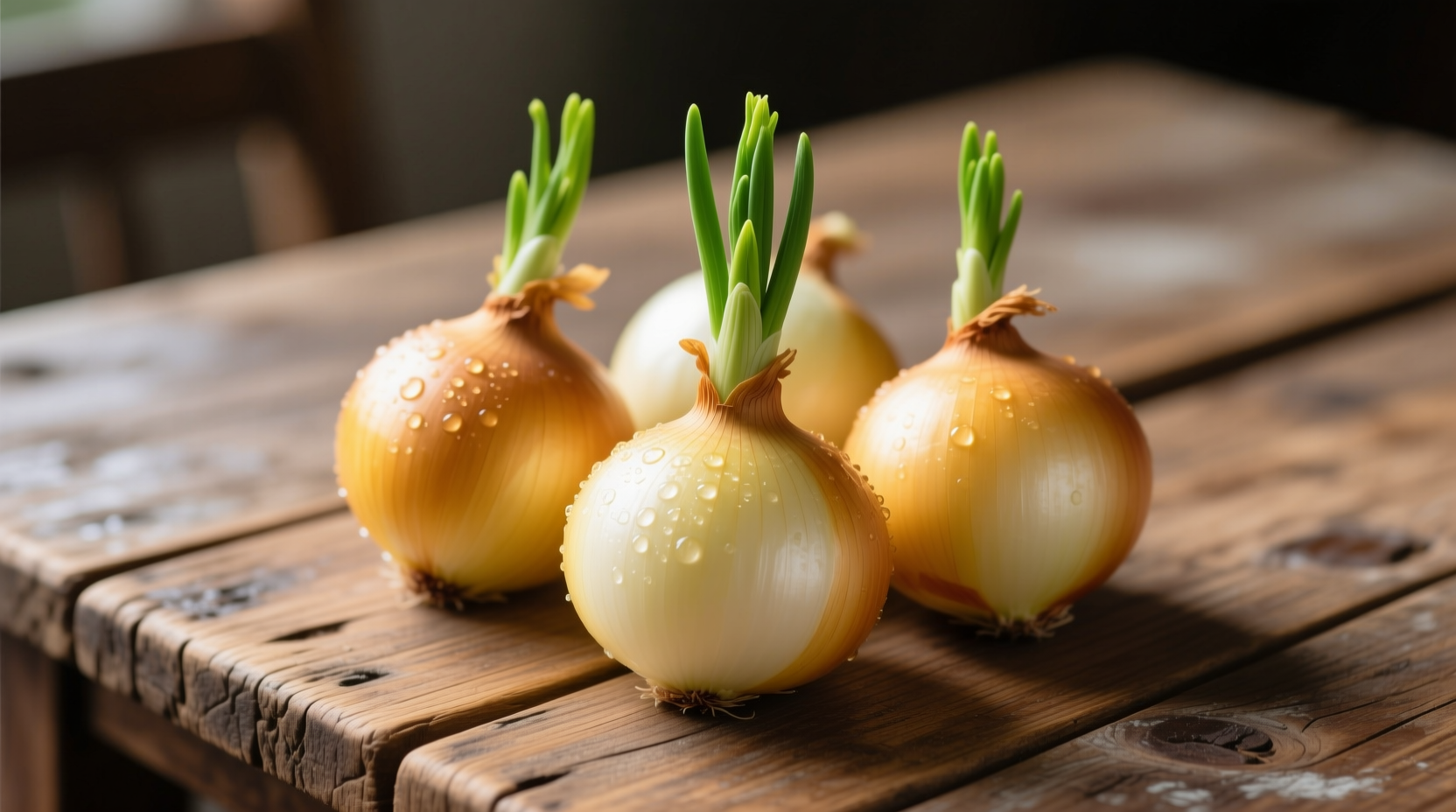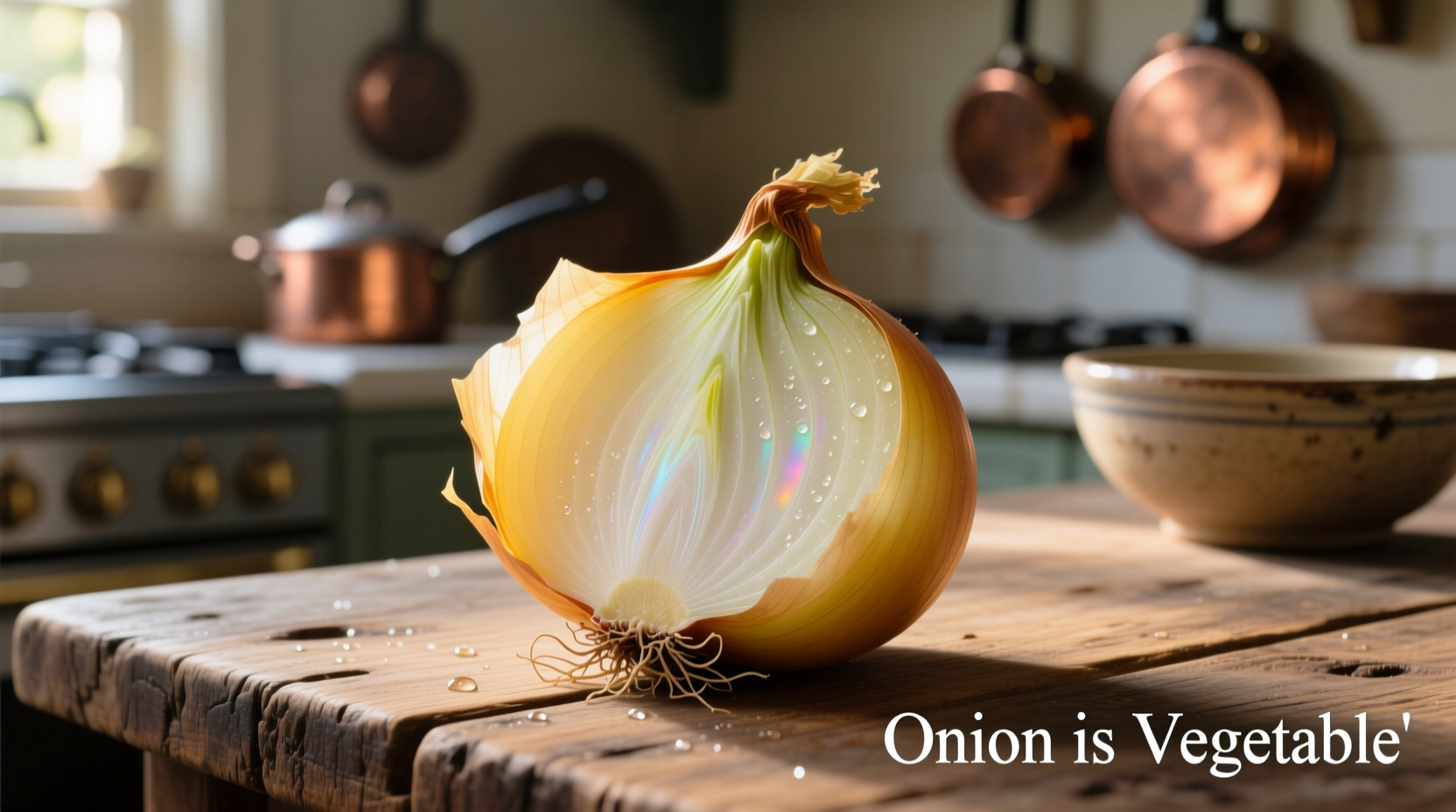Yes, onion is a vegetable both botanically and culinarily. Onions (Allium cepa) belong to the vegetable category in dietary guidelines, culinary practices, and botanical classification systems worldwide. This complete guide explains the science behind onion classification, nutritional benefits, and practical cooking applications.
The Straightforward Answer to Onion Classification
When examining whether onion is a vegetable, the answer is definitive: onions are vegetables through multiple classification lenses. Unlike fruits that develop from flowering plant ovaries, onions grow as modified underground stems called bulbs. The U.S. Department of Agriculture (USDA) and World Health Organization (WHO) consistently categorize onions within the vegetable group for nutritional and dietary purposes.
Botanical Classification: Why Onions Qualify as Vegetables
From a botanical perspective, vegetables encompass edible plant parts that aren't fruits. Onions develop as bulbous modified stems that store nutrients, placing them firmly in the vegetable category. The Royal Botanic Gardens, Kew classifies Allium cepa within the Amaryllidaceae family, confirming its status as a vegetable crop rather than a fruit-bearing plant.
| Classification System | Onion Category | Key Characteristics |
|---|---|---|
| Botanical | Bulb vegetable | Modified underground stem storing nutrients |
| Culinary | Aromatic vegetable | Used for flavor foundation in cooking worldwide |
| Nutritional (USDA) | Starchy vegetable subgroup | Provides vitamins, minerals, and fiber |
Nutritional Profile: The Vegetable Credentials
Nutritionally, onions demonstrate classic vegetable characteristics. According to USDA FoodData Central, a medium onion (110g) provides:
- 44 calories
- 10g carbohydrates (including 2g fiber)
- Significant vitamin C (12% of daily value)
- Good source of B vitamins and potassium
- Rich in antioxidants like quercetin
These nutritional attributes align perfectly with vegetable profiles rather than fruits, which typically contain higher sugar content and different vitamin compositions.

Culinary Perspective: Onions as Kitchen Essentials
Chefs worldwide treat onions as foundational vegetables. In culinary terminology, "vegetable" refers to edible plant parts used in savory dishes, which perfectly describes onions' role. Professional kitchens categorize onions within the "mirepoix" or "sofrito" vegetable trinity (along with carrots and celery) that forms the flavor base for countless dishes across global cuisines.
Addressing Common Misconceptions
Some confusion exists because onions belong to the Allium family, which includes garlic and leeks. However, this botanical grouping doesn't change their vegetable status. The misconception that "onions aren't real vegetables" often stems from their strong flavor profile compared to milder vegetables like lettuce or cucumbers. Yet flavor intensity doesn't determine vegetable classification.
Practical Applications for Home Cooks
Understanding onions as vegetables helps optimize their use in your kitchen:
- Storage: Keep onions in a cool, dry place away from potatoes (which release gases that accelerate onion spoilage)
- Preparation: Different onion varieties serve specific purposes—yellow onions for cooking, red for salads, sweet varieties for raw applications
- Nutrient preservation: Light cooking preserves more antioxidants than prolonged high-heat methods
- Dietary integration: Include onions in at least one daily vegetable serving to boost flavor and nutrition
Onions in Dietary Guidelines Worldwide
Major health organizations consistently classify onions as vegetables:
- The USDA MyPlate guidelines include onions in the vegetable group
- World Health Organization recommendations count onions toward daily vegetable intake
- Dietary Guidelines for Americans list onions among recommended vegetables
This universal classification reflects onions' nutritional composition and culinary usage patterns across cultures. Unlike botanical fruits that develop from flowers, onions grow as storage organs that provide essential nutrients without the sugar content typical of fruits.
Conclusion: The Vegetable Verdict
Onions unequivocally qualify as vegetables through botanical, nutritional, and culinary perspectives. Their classification as bulb vegetables aligns with how they grow, their nutrient profile, and their universal culinary application. Whether you're following dietary guidelines, planning meals, or studying plant biology, onions consistently demonstrate vegetable characteristics that distinguish them from fruits, herbs, or other food categories.
Frequently Asked Questions
Are onions considered vegetables in dietary guidelines?
Yes, all major dietary guidelines including USDA MyPlate and WHO recommendations classify onions as vegetables. They count toward your daily vegetable intake requirements in nutrition planning.
Why are onions vegetables and not fruits?
Onions develop as modified underground stems (bulbs) rather than from flowering plant ovaries like fruits. Botanically, fruits contain seeds and develop from flowers, while vegetables encompass other edible plant parts including roots, stems, and leaves.
Do onions count as one of your five-a-day vegetable servings?
Yes, onions absolutely count toward your recommended daily vegetable intake. A medium onion (about 110g) constitutes one standard vegetable serving in most nutritional guidelines worldwide.
Are there any situations where onions aren't considered vegetables?
In extremely rare culinary contexts, chefs might refer to onions as "aromatics" rather than vegetables, but this is a functional description, not a classification change. Nutritionally and botanically, onions remain vegetables regardless of culinary terminology.











 浙公网安备
33010002000092号
浙公网安备
33010002000092号 浙B2-20120091-4
浙B2-20120091-4